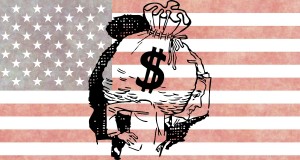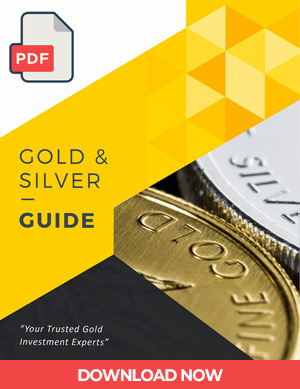Trump Says the U.S. Will Win Any Trade War; Our Debt Load Says Otherwise
![]() Bullion.Directory precious metals analysis 12 March, 2018
Bullion.Directory precious metals analysis 12 March, 2018
By Clint Siegner
Director of Money Metals Exchange
The president’s trade policy has been applauded by people seeking to protect domestic industry and criticized by free marketeers. There is no shortage of disagreement over the policy, but some of the outcomes seem easier to predict.
Higher price inflation is one probability.
Domestic manufacturers who use steel and aluminum are going to pay more for those metals and will need to raise prices. A wide gamut of goods ranging from airplanes and automobiles to steel building materials will soon cost more.
Unfortunately, the higher costs will put domestic manufacturers who must buy steel and aluminum at a disadvantage.
While they pay more for imports from Europe or Asia, the cars and appliances manufactured elsewhere and shipped into the U.S. aren’t affected.
Goldman Sachs estimates the steel tariffs will cost Ford and General Motors each $1 billion in profits. Imported models suddenly get a major cost advantage in the U.S. marketplace.
There is also the possibility of higher inflation driven directly by the foreign exchange markets.
 Disgruntled trading partners may choose currency warfare as their response to tariffs. This would involve liquidating dollars they hold as reserves. In the case of China, Japan, and the EU, those stockpiles are enormous.
Disgruntled trading partners may choose currency warfare as their response to tariffs. This would involve liquidating dollars they hold as reserves. In the case of China, Japan, and the EU, those stockpiles are enormous.
If Trump’s trade policy succeeds at reducing trade deficits it will likely increase upward pressure on interest rates. As the flow of surplus dollars headed overseas diminishes, so will demand for U.S. debt.
Major foreign holders of U.S. Treasuries might also retaliate against the tariffs by bumping Treasury bonds. China, in particular, has previously used the threat of liquidating its Treasury holdings as leverage.
Admiral Mike Mullen, the former chief of staff, declared the national debt as the greatest threat to national security in 2010.
President Trump apparently isn’t getting that same counsel. He has been vocal about any trade war being supposedly easy to win, given our trading partners are so dependent on exports to the U.S. However, he has not acknowledged the government’s dependence on debt.
This is troubling, especially since the administration has increased federal spending and reduced taxes – a combination that will dramatically increase U.S. reliance on borrowed money.
The President thinks he has a strong hand. But if the axiom about the borrower being slave to the lender is true, then our creditors may hold the Trump cards.
This article was originally published here Bullion.Directory or anyone involved with Bullion.Directory will not accept any liability for loss or damage as a result of reliance on the information including data, quotes, charts and buy/sell signals contained within this website. Please be fully informed regarding the risks and costs associated with trading in precious metals. Bullion.Directory advises you to always consult with a qualified and registered specialist advisor before investing in precious metals.











 Material provided on the Bullion.Directory website is strictly for informational purposes only. The content is developed from sources believed to be providing accurate information. No information on this website is intended as investment, tax or legal advice and must not be relied upon as such. Please consult legal or tax professionals for specific information regarding your individual situation. Precious metals carry risk and investors requiring advice should always consult a properly qualified advisor. Bullion.Directory, it's staff or affiliates do not accept any liability for loss, damages, or loss of profit resulting from readers investment decisions.
Material provided on the Bullion.Directory website is strictly for informational purposes only. The content is developed from sources believed to be providing accurate information. No information on this website is intended as investment, tax or legal advice and must not be relied upon as such. Please consult legal or tax professionals for specific information regarding your individual situation. Precious metals carry risk and investors requiring advice should always consult a properly qualified advisor. Bullion.Directory, it's staff or affiliates do not accept any liability for loss, damages, or loss of profit resulting from readers investment decisions.

Leave a Reply